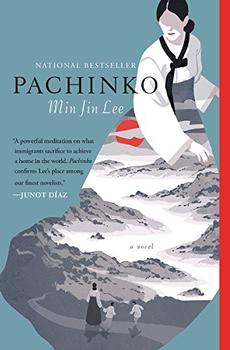Summary | Excerpt | Reading Guide | Reviews | Beyond the Book | Readalikes | Genres & Themes | Author Bio

The girl was from the other side of the island, beyond the dense woods. Her father, a tenant farmer, was one of the many who'd lost his lease as a result of the colonial government's recent land surveys. The widower, cursed with four girls and no sons, had nothing to eat except for what was gathered from the woods, fish he couldn't sell, or the occasional charity from equally impoverished neighbors. The decent father had begged the matchmaker to find grooms for his unmarried daughters, since it was better for virgins to marry anyone than to scrounge for food when men and women were hungry, and virtue was expensive. The girl, Yangjin, was the last of the four girls and the easiest to unload because she was too young to complain, and she'd had the least to eat.
Yangjin was fifteen and mild and tender as a newborn calf, the matchmaker said. "No dowry, of course, and surely, the father could not expect much in the way of gifts. Perhaps a few laying hens, cotton cloth for Yangjin's sisters, six or seven sacks of millet to get them through the winter." Hearing no protest at the tally of gifts, the matchmaker grew bolder, "Maybe a goat. Or a small pig. The family has so little, and bride prices have come down so much. The girl wouldn't need any jewelry." The matchmaker laughed a little.
With a flick of her thick wrist, Hoonie's mother showered the radish with sea salt. The matchmaker could not have known how hard Hoonie's mother was concentrating and thinking about what the woman wanted. The mother would have given up anything to raise the bride price demanded; Hoonie's mother found herself surprised at the imaginings and hopes rising within her breast, but her face remained collected and private; nevertheless, the matchmaker was no fool.
"What I wouldn't give to have a grandson of my own one day," the matchmaker said, making her closing gambit while peering hard at the boardinghouse keeper's creased, brown face. "I have a granddaughter but no grandsons, and the girl cries too much."
The matchmaker continued. "I remember holding my first son when he was a baby. How happy I was! He was as white as a basket of fresh rice cakes on New Year's—soft and juicy as warm dough. Tasty enough to take a bite. Well, now he's just a big dolt," feeling the need to add a complaint to her bragging.
Hoonie's mother smiled, finally, because the image was almost too vivid for her. What old woman didn't yearn to hold her grandson when such a thought had been inconceivable before this visit? She clenched her teeth to calm herself and picked up the mixing bowl. She shook it to even out the salt.
"The girl has a nice face. No pockmarks. She's well mannered and obeys her father and sisters. And not too dark. She's a little thing, but she has strong hands and arms. She'll need to gain some weight, but you understand that. It's been a difficult time for the family." The matchmaker smiled at the basket of potatoes in the corner as if to suggest that here, the girl would be able to eat as much as she wanted.
Hoonie's mother rested the bowl on the counter and turned to her guest.
"I'll speak to my husband and son. There's no money for a goat or a pig. We may be able to send some cotton wool with the other things for the winter. I'll have to ask."
The bride and groom met on their wedding day, and Yangjin had not been scared by his face. Three people in her village had been born that way. She'd seen cattle and pigs with the same thing. A girl who lived near her had a strawberry-like growth between her nose and split lip, and the other children called her Strawberry, a name the girl did not mind. When Yangjin's father had told her that her husband would be like Strawberry but also with a crooked leg, she had not cried. He told her that she was a good girl.
Excerpted from Pachinko by Min Jin Lee. Copyright © 2017 by Min Jin Lee. Excerpted by permission of Grand Central Publishing. All rights reserved. No part of this excerpt may be reproduced or reprinted without permission in writing from the publisher.
Knowledge is of two kinds. We know a subject ourselves, or we know where we can find information on it.
Click Here to find out who said this, as well as discovering other famous literary quotes!
Your guide toexceptional books
BookBrowse seeks out and recommends the best in contemporary fiction and nonfiction—books that not only engage and entertain but also deepen our understanding of ourselves and the world around us.